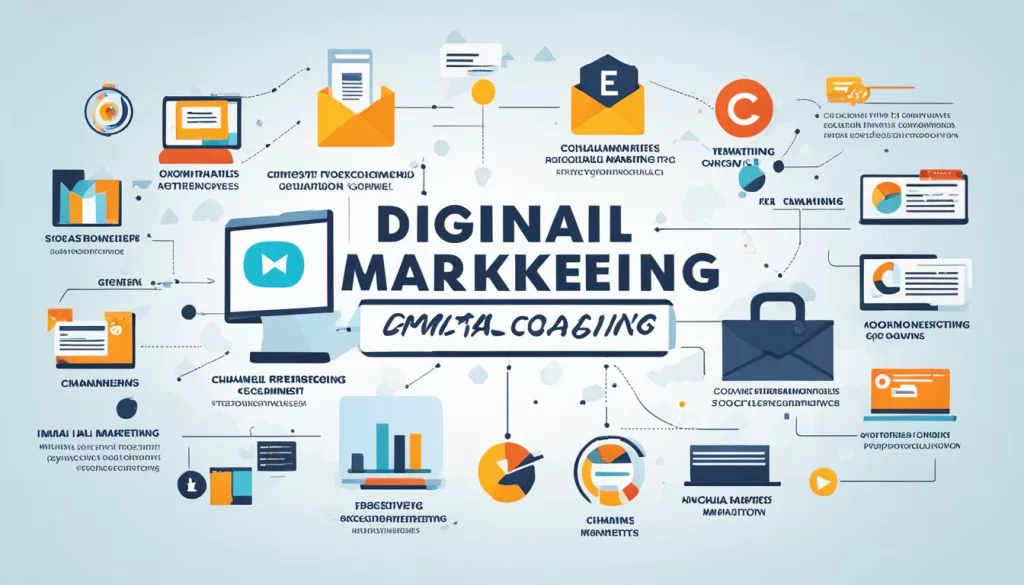Digital marketing strategies are essential for executive coaching firms to thrive in today’s competitive landscape. With the increasing reliance on the internet, executive coaching firms must leverage digital marketing techniques to attract their target audience, build brand awareness, and maximize client engagement. In this article, we will explore the key strategies that are effective for executive coaching firms in the digital space.
Key Takeaways:
- Digital marketing is crucial for executive coaching firms to stay competitive.
- Effective strategies include SEO, social media marketing, and online advertising.
- A strong online presence is vital for building credibility and attracting clients.
- Utilizing key digital marketing channels such as SEO, content marketing, and social media can help reach the target audience.
- Measuring success through KPIs and adapting strategies based on data is essential for sustainable growth.
Establishing a Strong Online Presence
Building a strong online presence is essential for executive coaching firms to succeed in today’s digital landscape. To establish credibility and attract their target audience, executive coaching firms need to focus on several key aspects:
1. Website Design
A professional and user-friendly website design is crucial for creating a positive online experience for potential clients. The website should have a clear navigation structure, intuitive layout, and visually appealing design. By providing a seamless browsing experience, executive coaching firms can effectively communicate their value proposition and showcase their expertise.
2. Branding
Effective branding sets executive coaching firms apart from their competitors and establishes credibility. It includes developing a unique brand identity, such as a logo and color scheme, that reflects the firm’s values and vision. Consistent branding across all online platforms helps build recognition and trust with the target audience.
3. Testimonials and Industry Certifications
Showcasing testimonials from satisfied clients on the website helps build trust and credibility. These testimonials provide social proof of the firm’s success and the positive impact it has had on clients’ lives. Additionally, highlighting industry certifications and qualifications demonstrates the firm’s expertise and reinforces credibility.
By implementing these strategies and elements, executive coaching firms can establish a strong online presence that resonates with their target audience and builds credibility. This online presence acts as a virtual storefront, making a lasting impression on potential clients and increasing the chances of conversions.
”A professional website design, effective branding, and testimonials help executive coaching firms build credibility and attract their target audience.” – [Expert Name]
| Benefits of a Strong Online Presence for Executive Coaching Firms |
|---|
| Increased visibility and reach to a wider audience |
| Enhanced credibility and trust with potential clients |
| Opportunity to showcase expertise and industry qualifications |
| Increased client engagement and lead generation |
| Competitive advantage in the digital landscape |
Key Digital Marketing Channels and Strategies
In today’s digital age, executive coaching firms have a multitude of options when it comes to reaching their target audience. By leveraging various digital marketing channels and strategies, these firms can effectively engage with potential clients and expand their reach. Here, we will explore the key digital marketing channels and strategies that executive coaching firms can employ to maximize their online presence and achieve their business goals.
1. Search Engine Optimization (SEO)
Search engine optimization (SEO) is a fundamental aspect of digital marketing for executive coaching firms. By implementing SEO techniques, such as optimizing website content and meta tags, firms can improve their visibility on search engine results pages. This ensures that potential clients can easily find them when searching for relevant keywords and phrases. A strong SEO strategy helps drive organic traffic to the firm’s website, increasing the chances of attracting qualified leads.
2. Content Marketing
Content marketing plays a crucial role in establishing executive coaching firms as industry authorities and thought leaders. By publishing high-quality blog articles, informative resources, and valuable content, these firms can showcase their expertise and provide value to their target audience. Content marketing also helps build brand loyalty and trust by consistently delivering valuable information and insights. Moreover, well-crafted content has the potential to rank well on search engines, further enhancing the firm’s online visibility.
3. Social Media Marketing
Social media marketing allows executive coaching firms to connect with their audience on popular social platforms such as Facebook, LinkedIn, and Twitter. By actively engaging with followers, sharing relevant content, and participating in industry discussions, firms can increase brand awareness and foster meaningful relationships. Social media platforms also provide valuable insights into the interests and preferences of potential clients, allowing firms to tailor their messaging and content accordingly.
4. Email Marketing
Email marketing remains an effective digital marketing channel for executive coaching firms. By building an email list of interested prospects and maintaining regular communication, firms can nurture leads and stay top-of-mind with potential clients. Email marketing campaigns can include valuable content, updates on industry trends, and personalized offers, providing meaningful touchpoints throughout the buyer’s journey. The key to successful email marketing is delivering relevant and valuable information tailored to the recipient’s needs and interests.
5. Paid Advertising
Paid advertising offers executive coaching firms the opportunity to expand their reach and attract new clients through targeted campaigns. Platforms like Google Ads and social media advertising enable firms to display ads to their desired audience based on demographics, interests, and online behavior. Paid advertising allows for precise targeting and provides measurable results, making it an effective strategy for increasing brand visibility and generating leads. However, it is important to carefully manage ad budgets and continuously optimize campaigns to maximize return on investment.
| Digital Marketing Channel | Main Benefits |
|---|---|
| Search Engine Optimization (SEO) |
|
| Content Marketing |
|
| Social Media Marketing |
|
| Email Marketing |
|
| Paid Advertising |
|
By strategically employing these key digital marketing channels and strategies, executive coaching firms can effectively engage their target audience, build brand awareness, and drive business growth. However, it is important to continuously monitor and analyze the performance of these channels, adapting strategies as needed to stay ahead in the competitive digital landscape.
Measuring Success and Adapting Strategies
For executive coaching firms, measuring the success of digital marketing efforts is essential to optimize strategies and achieve sustainable growth. By tracking Key Performance Indicators (KPIs), firms can gain valuable insights into the effectiveness of their campaigns.
Key Performance Indicators (KPIs) allow executive coaching firms to monitor and evaluate important metrics that directly impact their online success. Some essential KPIs for tracking digital marketing performance include:
- Website traffic: Monitoring the number of visitors to the website helps gauge its visibility and reach.
- Lead generation: Tracking the number of leads generated through digital marketing efforts provides insights into campaign effectiveness.
- Conversion rates: Measuring the percentage of website visitors who take desired actions, such as filling out a contact form or making a consultation request, helps evaluate marketing strategies’ impact on conversions.
- Social media engagement: Analyzing the level of engagement on social media platforms indicates the effectiveness of social media marketing campaigns.
To optimize digital marketing efforts, executive coaching firms can utilize A/B testing. A/B testing involves creating and comparing multiple versions of content, such as website landing pages or email subject lines, to determine which version performs better. This iterative approach enables firms to continually refine their strategies for maximum impact.
Analyzing competitors’ strategies and tactics can provide valuable insights into the industry landscape. By understanding what competitors are doing well, executive coaching firms can identify areas for improvement and uncover new opportunities for differentiation.
Utilizing analytics tools, such as Google Analytics, is essential for monitoring website performance. These tools offer comprehensive data on website traffic, user behavior, and conversion rates. By analyzing this data, firms can gain a deeper understanding of their audience and make data-driven decisions to adapt their strategies.
Adapting digital marketing strategies based on data and insights ensures continuous improvement and keeps executive coaching firms ahead of the curve.
“Data-driven decision-making is key to success in the competitive digital marketing landscape.”
By combining robust analytics tools, competitor analysis, and A/B testing, executive coaching firms can effectively measure success, identify areas for improvement, and adapt their strategies to drive sustainable growth.
| KPIs | Description |
|---|---|
| Website Traffic | Number of visitors to the website. |
| Lead Generation | Number of leads generated through digital marketing efforts. |
| Conversion Rates | Percentage of website visitors who take desired actions. |
| Social Media Engagement | Level of engagement on social media platforms. |
Continually monitoring and analyzing these KPIs empowers executive coaching firms to make data-driven decisions that result in improved digital marketing performance.
Conclusion
Implementing effective digital marketing strategies is crucial for the success and growth of executive coaching firms. In today’s competitive coaching landscape, a strong online presence is essential for attracting the target audience and establishing credibility. By utilizing key digital marketing channels and strategies, coaching firms can increase engagement, build brand awareness, and ultimately achieve sustainable growth.
Measuring success through Key Performance Indicators (KPIs) and analytics tools allows coaching businesses to track important metrics and make data-driven decisions. By adapting strategies based on insights gained from analyzing competitors and conducting A/B testing, executive coaching firms can continuously improve and optimize their digital marketing efforts.
Staying current with industry trends is paramount in the rapidly evolving world of digital marketing. By keeping abreast of the latest best practices and incorporating new strategies, coaching firms can maintain a competitive edge and ensure ongoing success.
In summary, a well-executed digital marketing plan is a powerful tool for executive coaching firms looking to thrive in the online space. By leveraging the inherent capabilities of digital marketing, coaching businesses can attract their target audience, achieve online success, and drive sustainable growth.
FAQ
What are digital marketing strategies for executive coaching firms?
Digital marketing strategies for executive coaching firms include SEO techniques, social media marketing, content marketing, email marketing, and paid advertising. These strategies help attract the target audience, build brand awareness, and increase client engagement.
How can executive coaching firms establish a strong online presence?
Executive coaching firms can establish a strong online presence by creating a professional website that is user-friendly and visually appealing. Effective branding, showcasing testimonials and industry certifications, helps build trust with potential clients.
What are the key digital marketing channels and strategies for executive coaching firms?
Key digital marketing channels and strategies for executive coaching firms include search engine optimization (SEO), content marketing through blogging and valuable resources, social media marketing for engagement and brand building, email marketing for lead nurturing, and paid advertising to expand reach and attract new clients.
How can executive coaching firms measure success and adapt their strategies?
Executive coaching firms can measure success by tracking Key Performance Indicators (KPIs) such as website traffic, lead generation, conversion rates, and social media engagement. A/B testing allows for comparison and optimization, analyzing competitors helps identify areas for improvement, and using analytics tools like Google Analytics helps monitor website performance.
Why are digital marketing strategies important for executive coaching firms?
Implementing effective digital marketing strategies is crucial for the success and growth of executive coaching firms. These strategies help attract the target audience, increase engagement, and achieve sustainable growth in the competitive coaching landscape.






